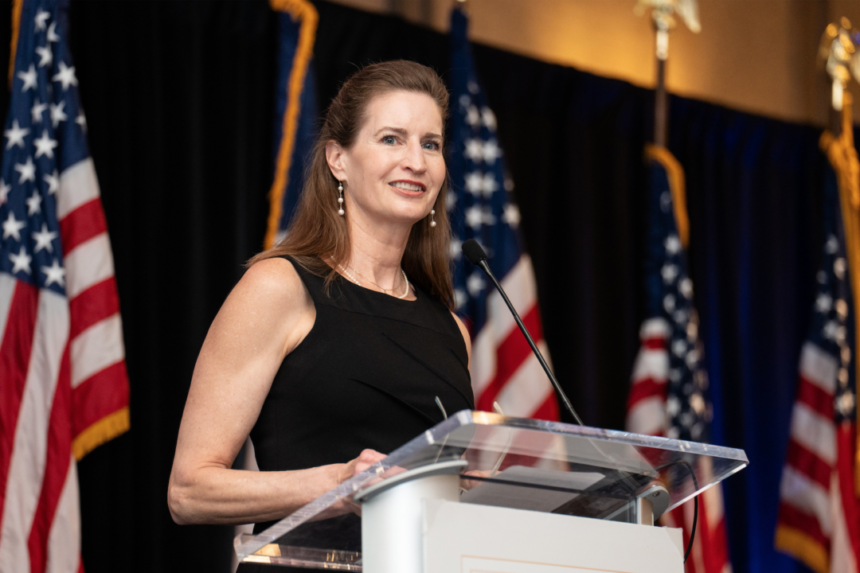Jan Jekielek: The proposal to establish this system of natural asset companies was defeated, and this has been celebrated as a victory. Please explain to us what this is and why it’s important.
Margaret Byfield: In September 2021, the New York Stock Exchange partnered with a group called the Intrinsic Exchange Group [IEG] that was started and funded by the Rockefeller Foundation. IEG is supported by the same entities pushing the climate crisis narrative, the 30 by 30 agenda, and net zero decarbonization—all agendas that will lock up the land and our productivity.
They are the entities that push this new vehicle called a natural asset company. This would allow for the enrollment of our protected resources into these companies, along with natural processes called ecosystem services that can be enrolled in these companies, and then private entities. In other words, the same people who are pushing the agenda to lock up our protected land would then be the investors in the private vehicle where these are enrolled and be able to profit off of them.
It was a stealth attempt to gain control over American land and resources. The SEC [U.S. Securities & Exchange Commission] issued the proposed rule October 4, 2023, and allowed only 21 days of comment. Then they were going to make their decision on November 18 to list these natural asset companies. That would have started something extremely detrimental to our nation.
The environmental movement is not about whether we’re going to use the resources. It’s about who is going to use the resources. The United Nations and the World Economic Forum have been pursuing this for years.
Mr. Jekielek: Let’s hear about your background to understand where you’re coming from.
Ms. Byfield: I was raised on a ranch in Nevada, a large sized acreage of 1,100 square miles. It takes about 50 acres to feed a cow, so that takes a lot of land.
Unless you live in the West, people don’t understand that 50 percent of the West is owned by the federal government. The East is privately settled, which is how our country was supposed to be settled until you got to the West, and that’s when politics changed. In Nevada, 87 percent of the land is government-owned.
We owned the grazing rights and the water. But because we owned that water, the U.S. Forest Service filed an application over our water rights. If we were to abandon our water rights, they would acquire those and then use their regulatory powers to basically drive us out of business.
We fought them for 13 years. Finally, in 1991, my parents filed the first federal lands grazing-taking case against the federal government.
We won every round except the last one. Then it was appealed to the U.S. Court of Appeals-D.C. circuit and came before three eastern judges who had no concept of the federal lands issues. They said we didn’t have standing, and kicked the case out.
After 27 years in court, we lost the ranch and were never compensated. The good thing is that we had a front seat in the fight. I grew up with a different understanding of the power of the federal government when they own the land and how much control they have over the people.
Our case is a good illustration of what’s wrong with our system of government. There’s a fourth branch of government, the administrative agencies. Congress will write a law like the National Forest Management Act, which gives the U.S. Forest Service the directive to manage the national forests, and then they write regulations on how to implement that. Through that rulemaking process they’re actually writing law. They also control the administrative judges who enforce and execute the law. All those powers come together in those agencies, making them almost untouchable.
Mr. Jekielek: Please explain the 30 by 30 plan.
Ms. Byfield: 30 by 30 is an international agenda to permanently protect 30 percent of the world’s land and oceans by 2030. When they say permanently protect, they mean lands that the people cannot utilize. It has been implemented in other places, like the Netherlands. Natura 2000 is basically 30 by 30 in the European Union, which has led to the farmer protests we’re seeing.
When President Biden was elected, the 30 by 30 agenda was initiated six days after he came into office through Executive Order 14008. The Biden administration is the first to go all in with implementing the UN agenda.
Agendas like 30 by 30 will really harm our food production. They will control what happens to the protected lands. We will be the new serfs. This hearkens back to something my dad said 30 years ago, “You either have the right to own property or you are property.”
If you own a piece of land, it gives you the ability to grow your own food, raise your family, and produce something that contributes to the local economy. It allows people to be independent.
The connection between land and liberty is profound and essential.
Those advocating for the 30 by 30 agenda understand this relationship. It is crucial for Americans to realize that these agendas are attempting to exert control over our property and diminish the role of private landowners.
Education is key in raising awareness about this issue. I have confidence that once people are informed, they will act in the best interest of our nation. I have faith in the American people, and initiatives like yours play a vital role in shedding light on these matters.
This interview has been edited for clarity and brevity.







